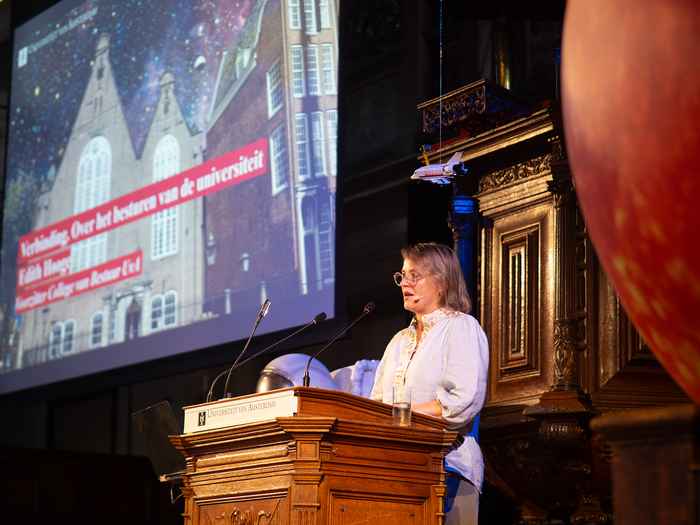Opening of academic year 2024-2025: The wonder of science
3 September 2024
Some UvA researchers gave a mini-lecture, attendees participated in a musical experiment and there was a musical interlude. The meeting was briefly interrupted a few times by protesters. They were given the opportunity to make their voices heard, after which the opening could continue.

Connection
In these complex times, it is important to always seek connection within our university. According to Hooge, active participation on all fronts and ‘joint governance’ around complex issues can ensure broader support and connection within the UvA. ‘It helps to restore mutual connection and trust. After the (run-up to the) demonstrations and all that came with them, numerous initiatives have been taken in recent months relating to listening, dialogue and consultation.'
Connection between universities is also crucial in the current political climate. Hooge: ‘There is increasing polarisation and we are witnessing "the disappearance or at least quieting of the political middle ground and a hardening of debate styles." This can cause splits in university communities, including our own, with academic freedom coming under pressure.’
Black holes and the universe through the ages
Astronomer Nathalie Degenaar talked about the mystery of black holes in her mini-lecture. Thanks to ever-improving telescopes, we are learning more about what black holes are and the role of gravity in them. The best evidence for the existence of black holes comes from our own Milky Way (Centaurus A).
Science historian Rens Bod showed in his mini-lecture that ancient ideas about the universe are surprisingly current and inspiring. Studying the universe has been going on for thousands of years. For instance, the oldest known representation of our universe dates back to the 16th century BC. And as early as the 6th century BC, it was thought that multiple or infinite universes could possibly exist. A theory that is being studied again today.
Experiment with catchy music
The meeting ended with an interactive experiment by the Amsterdam Music Lab. Asley Burgoyne let attendees hear different music fragments as part of their research into catchy music. You can participate in the experiment yourself on the Amsterdam Music Lab website.